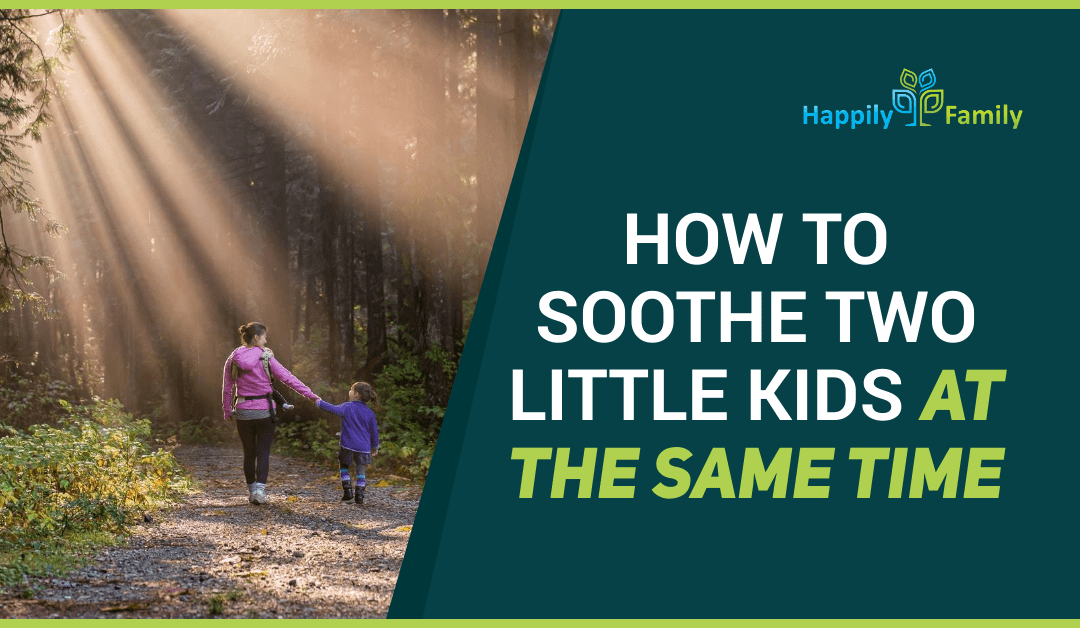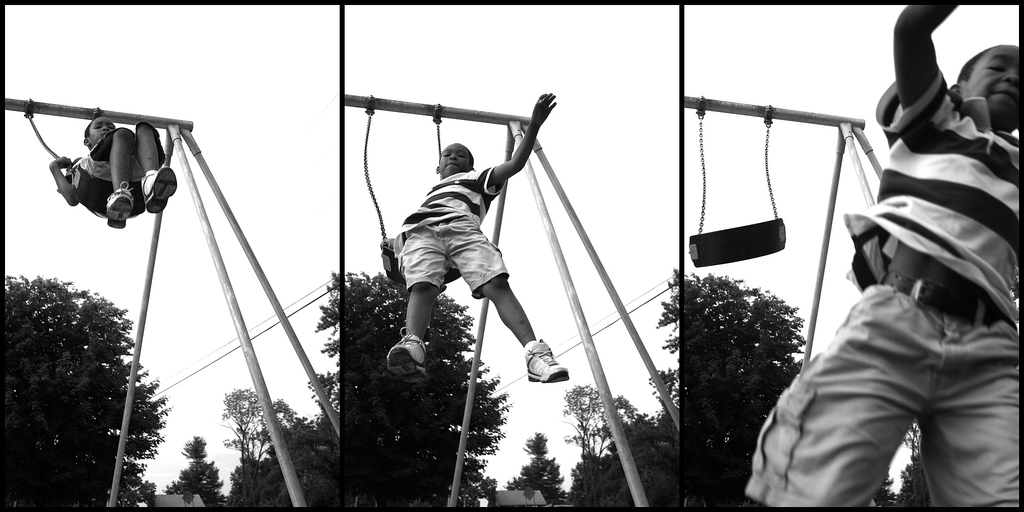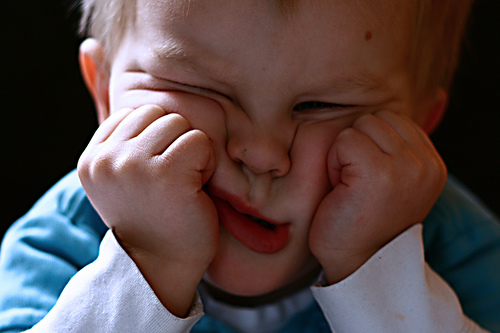We’ve been exploring what to do with challenging behavior on the blog during the past few weeks.
One mom wrote something to us that touched my heart–because I so clearly remember those days of caring for two little ones at the same time.
This is what she said…
I really like this approach but with a 3.5 year old that is very jealous of his 9 month old brother I’m not sure how to do it.
The 3 year old gets upset when I breastfeed his brother and has become aggressive towards me. He screams, hits and explodes. I know he is suffering. He doesn’t want to share his mom with someone else. He wants attention but I only have two arms. I spend all my time with both of them and I do one-on-one time with my eldest at least an hour a day, but he suffers when the baby is crying (nobody will calm him except me) and I need to go with the baby. I get frustrated because I don’t know how to shift my eldest’s behavior and make him accept his brother.
I get upset when my eldest hits the baby and I scream at him very loudly which makes him cry and sometimes I handle that badly. I don’t want the baby to be hurt.
I feel it is unfair that my eldest grew up in a very calm environment and my youngest has to experience the bad moods of his brother. I want a bit of peace and harmony at home (I know it is not always possible but I want at least some moments in which they can be together without me fearing that the baby will be hurt). I would like my eldest to calm down and stop hitting me.
Any help would be super appreciated! Many thanks!!!
Have you ever found yourself trying to care for two kids at the same time and feeling stuck?
For this situation, we’ll build on what we’ve talked about in the past 2 blog posts.
First, we start with the 5 Questions. We’re going to make some educated guesses about what might be happening in this family for this mom.
Note: These are our best guesses about what the mom is thinking and feeling (about herself and her child) in this situation. Perhaps this mom would answer these questions this way…
- What is my child doing?
“My 3-year-old screams and hits me or the 9 month old baby when I breastfeed. I do one-on-one time with my eldest at least an hour a day.” - What do I imagine he is feeling?
“I imagine he is feeling sad, jealous, angry, confused, and maybe worried or bored.” - What need is he attempting to meet?
“Maybe he’s trying to connect with me (or with the baby, even though he is connecting with both of us in a negative way–through hitting). Maybe he needs some reassurance (that he is still loved, and cared for). Maybe he needs something to do because he doesn’t have the skills to entertain himself yet.” - What are my feelings?
“I feel frustrated and disappointed that this is happening. I feel anxious, sad, and scared that the baby might get hurt or that the 3-year-old is not learning skills that will prepare him in life. I feel hopeless, helpless, resigned, tired, and overwhelmed because I don’t know what to do about this problem. I’m already doing 1 hour of one-on-one time with him every day, I’ve tried everything I can think of. I feel angry and irritated with my eldest because this behavior appears purposeful.” - What needs of mine are not being met?
“I need peace, harmony, cooperation, connection, and reassurance that I can nurture the development of both my children and keep them both safe. I need rest, relaxation, and even fun in my day (I spend SO much time caring for my kids that sometimes I feel that I’ve lost myself). I need support; I’m overwhelmed by caring for two young ones–and doing everything else around the house.”
First of all, I’d like to say to this mom…
I can imagine it’s overwhelming to care for both your children at the same time. You are trying so hard, doing one-on-one time with your child for an hour, breastfeeding (which is also a commitment) and who knows what else in addition. It makes sense that you might feel frustrated, disappointed, irritated, exasperated, tired, hopeless and anxious. It makes sense if you’re concerned for the well-being of both your children.
So what’s the next step?
Win-Win Solution
What we like to talk about at Happily Family is coming up with win-win solutions, which basically means that you and your child work together to come up with a strategy that meets your needs and theirs too!
Collaborating with your child might seem like a hassle or just plain inefficient, but there are a lot of benefits to this parenting approach, according to the research.
The first step of a win-win solution is to really understand what is going on for your child, fully listen to them, and give them some empathy (which you can do, even if you disagree with how your child has acted!).
Use Conversation to Fully Understand Your Child
Because a 3-year-old is still developing language and his emotional vocabulary–you might need to guess what is going on for him.
Talking to him “outside the moment” (maybe during your one-on-one time) could be the easiest way to connect and hear his perspective.
Here are some possibilities of what you can say:
“Sometimes when I’m feeding the baby you feel so mad and sad that you hit me and the baby. What are your hitting hands trying to say to me?”
“Are you mad because you want to keep playing with me and the baby and we’re not available when I’m breastfeeding?”
“Are you bored because you don’t know how to have fun while I’m feeding the baby?”
“Are you sad because you also want some snuggle time with me just like the baby is getting?”
“Oh! All those feelings make sense.”
Give Empathy to Your Child (Even if You Don’t Agree)
As you are talking, empathize with your child. You can reflect back and summarize what you’ve heard without agreeing or disagreeing.
If you aren’t sure how to empathize, you can try these ideas…
“It’s so hard when you want to play and the baby needs to be fed. You feel frustrated and disappointed.”
“You didn’t want to pause the game. We were having so much fun. It’s hard to figure out what to do while you wait.”
“You feel so sad that the baby gets all this snuggle time. You want snuggle time too.”
Brainstorm a Solution to Try for a Period of Time
You and your child can brainstorm solutions that might work for both of you. Give your child the opportunity to contribute to the brainstorming. Be flexible. Be willing to try something new for a short period of time.
You could say:
“What could we do so that I can feed the baby, and you also can have some fun, or snuggles?”
-OR-
“What are your ideas for how to solve this problem?”
Here are strategies you could suggest:
“I have two arms. I can still be on the couch so one arm can be for the baby. And the other arm is so I can snuggle with you.”
“How about when I feed the baby, you choose a book that I can read to you?”
“How about you play [favorite game to play by themselves] when I’m feeding the baby?”
“How about you eat [name their favorite healthy snack] while I feed the baby?”
Whatever strategy you choose, sometimes it’s helpful to write it down so both of you have a clear understanding of the new idea. With a 3-year-old, draw out the new solution with stick figures or symbols, so your child can still “read” it.
Check In and See How It’s Working
After a period of time–maybe 1-3 days–come back and talk about how this strategy is working (or not working) for you and your child. The solution may or may not work the first time.
Remember, the goal is to be working together.
If needed, brainstorm a different strategy.
Rinse and repeat!
A Final Word about Hitting
Some parents reading this approach might wonder, “What about telling the child not to hit?”
Certainly, it’s okay to say, “I’m not willing for you to hit me or the baby. That hurts.” It’s important to demonstrate healthy boundaries and to set limits with our children.
However, more often than not, if you’re using the steps outlined above, your child will stop hitting.
We believe that hitting–or any form of violence–is an expression of an unmet need. A young child might not have the language or self-awareness to be able to express, “Mom, I’m sad and scared when you feed the baby. I need you to hug me so that I get some reassurance. And I need some help finding something to do because I don’t know how to entertain myself.”
Ultimately what causes a child to stop hitting, is when you and he have figured out a better, more satisfying way for him to meet his needs. This is tricky with young children who are developing language and problem-solving skills. In our experience working with young children, telling them “don’t hit” isn’t maximizing the learning opportunity. Young children learn more quickly to use their words and problem-solving skills when we role model and demonstrate the language and problem-solving skills that we want them to acquire.










Thank you so much Cecilia! We had the conversation and from time to time we discuss about his feelings and even if my son didn’t come up with a formal plan, it seems he started to understand that hitting and screaming are not the right choice and that he can use his own voice to tell me that he wants attention or he is bored and wants to play with me. Things are improving and I think my son realised that he is loved and seem (I think that was his main concern). Again, thank you for the wise advice ❤️
Anna, I’m so glad it worked! You’re right the most important things are that he knows he is loved and he’s learning to ask for what he wants. Well done!!